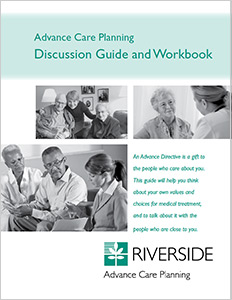
Advance Care Planning
 Everyone is different. This is especially true about making choices in our medical care. If you were injured or very sick and unable to speak for yourself, it could be difficult for your family and doctors to know what choices you would make for yourself. Talking about these things while you are well is a gift to the people who care about you. If they ever have to make difficult decisions, they will be comforted by knowing what you would have done.
Everyone is different. This is especially true about making choices in our medical care. If you were injured or very sick and unable to speak for yourself, it could be difficult for your family and doctors to know what choices you would make for yourself. Talking about these things while you are well is a gift to the people who care about you. If they ever have to make difficult decisions, they will be comforted by knowing what you would have done.
You can communicate your own choices and reduce the stress on people who care about you by writing an Advance Directive. This is about your own values, not filling out forms, so take some time to reflect on the things that are important to you, and talk about them with the people who are close to you.
Your choices may change over time, so talk about these things often, and update your Advance Directive when needed.
It may be difficult to begin the conversation, but everyone can benefit from sharing their wishes with those who are closest to them. Here are some suggestions for starting the discussion:
News Stories - Have you ever seen a news story about someone who was seriously hurt and on life support? What was your reaction? What do the people who are closest to you think?
Experiences - Has anyone close to you become so ill that others had to make decisions about their medical treatment? How did that affect what you might want for yourself and your family?
Quality of Life - What makes life worth living for you? Is there a condition that you would find "worse than death?"
Your Medical Condition - If you have an illness, do you understand how it might change over time? Has your doctor talked about possible complications that would lead to your family having to make medical choices for you?
Talk to Your Loved Ones
For people who have serious illnesses, your doctor can be a guide to what complications could arise, and what medical treatments could be offered. With your doctor's guidance, you may be able to give some specific instructions to your Healthcare Agent about your wishes. Some good questions to start with are:
- How serious might this illness get?
- What symptoms can I expect if things worsen?
- How can these symptoms be controlled?
- What kind of help will I possibly need in the future?
Think about What Results You Would Want from Your Medical Care
It is important to think about what you want your medical treatments to do for you, rather than naming the specific treatments. When you and your family know your goals, your doctors can work with you to find treatments that can help you reach those goals. By working with your doctors, you can set goals that are realistic for your condition and make a plan.
Your Advance Directive is the plan for end-of-life care. If you are healthy, chances are that your Advance Directive will only be needed if you had an unexpected illness (like a stroke) or injury (like a brain injury). In these situations, doctors do everything possible to save your life and treat you in the hospital in hopes of a full recovery. If recovery does not seem likely after the initial treatments and you remain unable to interact with people, your Healthcare Agent will need to know how you would want them to proceed.
Bob's Story
Bob was always a fighter. He was sure that he would beat the cancer that he was diagnosed with last year. He talked about his treatment goals with his doctor, and made it clear that his goal was to recover. However, when the last round of chemotherapy did not work, he knew he had to readjust his goal. He decided to live as long as possible, as long as he could still enjoy time with his family. On his Advance Directive, he wrote that he would want life prolonging treatments as long as he could visit with his family, and if that became impossible that he would not want further aggressive treatment.
Choosing a Healthcare Agent
Many people think that their family members know what they would want if they were too sick or injured to make their own choices, but research shows that most do not. This is why talking with the people closest to you, while you are well, is so important.
When you choose someone to speak for you and name that person on an Advance Directive, he or she is called a Healthcare Agent. You should choose someone who will:
- Understand the choices that you would make for yourself
- Honor your choices, even if they disagree
- Be available to talk with doctors and others on the health care team
Jane's Story
Jane's oldest son Tom was always the most dependable. When her husband died, Tom settled all of his business affairs and since then has made sure that Jane had everything she needed. But when she thought about her own wishes for end-of-life care, she remembered that her son had a very hard time letting his father go. She told him that she loved him very much, and didn't want to put him in that position again, so she named her daughter on her Advance Directive as the person who would take care of medical decisions. Jane told both of her children what she wanted and gave them copies of her Advance Directive.
Frequently Asked Questions
What is an Advance Directive?What is the Health Care Decisions Act?
Do I need an attorney to write an Advance Directive?
Does the form have to be notarized?
How can I revoke or change my Advance Directive?
How can I be sure that my Advance Directive will be honored?
If I don't want CPR, will this be honored?
What is a Living Will?
What are "life-prolonging treatments?"
What is CPR?
How can I decide if I want CPR or not?
What is a "terminal condition?"
What is a "persistent vegetative state?"
This is overwhelming. How can I decide?
What is an Advance Directive?
This is any declaration that a person makes about their wishes for medical treatment in advance of their inability to speak for themselves. A written Advance Directive form in Virginia usually includes naming a Healthcare Agent, wishes for general healthcare and for end-of-life care, and instructions for organ and tissue donation. In order to be legally valid, a written Advance Directive must be signed and two witnesses must also sign. [ top ]
What is the Health Care Decisions Act?
The law in Virginia states that all adults of sound mind "have a right to determine what shall be done with his [or her] own body." The Health Care Decisions Act provides specific directions on how Advance Directives are to be created and honored. You can read the Health Care Decisions Act by going to www.virginia.gov and searching for Health Care Decisions Act. [ top ]
Do I need an attorney to write an Advance Directive?
No. You can write your own Advance Directive, but some attorneys are able to provide guidance. If you are managing a chronic illness, it is best to talk with your doctor so that you can include the kinds of decisions that might apply to you. [ top ]
Does the form have to be notarized?
No. In Virginia, two witnesses over the age of 18 are required; if it is notarized, there must also be another witness' signature. [ top ]
How can I revoke or change my Advance Directive?
It is best to destroy old copies and create a new Advance Directive. You can revoke an Advance Directive by destroying it or crossing through all pages and writing "Revoked" with your signature and date. [ top ]

How can I be sure that my Advance Directive will be honored?
Advance Directives are only used if you are not able to speak for yourself. Your Healthcare Agent will become your advocate if this happens. In an emergency situation, it is usually not clear to doctors if you might be able to recover, so they may begin treatments until your prognosis is clearer. [ top ]
If I don't want CPR, will this be honored?
Only a physician can order that CPR not be performed. This is called a "Do Not Resuscitate" (DNR) order. If your Advance Directive says that you do not want CPR in the event that you have a terminal illness, a doctor in the hospital can write this order. If you are at home, your doctor can write this order on a special form that is recognized and honored by emergency responders and other doctors. If you want to have such an order in place now, discuss it with your doctor. [ top ]
What is a Living Will?
People often use this term interchangeably with Advance Directive, but it means the portion of your Advance Directive that specifies your wishes for end-of-life medical care. [ top ]
What are "life-prolonging treatments?"
In Virginia, this term includes artificial nutrition, IVs for hydration, ventilation (breathing machine) and cardiopulmonary resuscitation (CPR). You can use your Advance Directive to make specific wishes about each of these treatments, but it is important to tell your Healthcare Agent what results you would want if they were provided. [ top ]
What is CPR?
This is cardio (heart) pulmonary (lungs) resuscitation (starting something that has already stopped). Chest compressions are used to stimulate the heart, and air is forced into the lungs. In the hospital and when 911 is called, drugs are injected, electric shock may be used and a tube is inserted into the throat so that a machine can breathe for the person. [ top ]

How can I decide if I want CPR or not?
This is different for everyone, and it depends on your personal values combined with your medical condition. When it is used in people who are in the late stages of an illness or who are frail with chronic illnesses, the success rate is much lower. Even when successful in these people, recovery may not be complete and they could require 24-hour nursing care or could be dependent on a breathing machine. If you are considering this question, it is best to talk with your doctor about the likely outcomes in your own situation. [ top ]
What is a "terminal condition?"
Most Advance Directives state that certain treatments should or should not be provided if two doctors certify that you are in a terminal condition. As defined in Virginia, this means a condition from which you are unlikely to recover and death is imminent, or you are in a persistent vegetative state (PVS). Your own wishes for treatment may be different if you are either terminally ill or in a persistent vegetative state. You can use your Advance Directive to be specific about these choices. [ top ]
What is a "persistent vegetative state?"
Someone who is in a persistent vegetative state is not aware of themselves or their surroundings, has no movements other than reflexes, and recovery is not expected. [ top ]
This is overwhelming. How can I decide?
No one can foresee exactly what is going to happen to them at the end of life. The best you can do is talk with the people who are close to you about what makes life worth living, and what conditions you think make it too burdensome to continue. Chances are you will change your opinions over time, and as you see others' experiences. Take any opportunity to talk about these issues. These are hard but important things to talk about. Enlist the help of your doctor or call us if you are struggling. [ top ]
Materials to Download

Discussion Guide and Workbook
Use this workbook to guide discussions with your doctor and the people who are close to you, and to prepare for writing your Advance Directive.
Advance Directive
This form includes identifying a Healthcare Agent, your wishes for general healthcare as well as end-of-life care, and your wishes for organ donation. Spanish version
Protest Addendum
When people become very ill, they may become confused to the point that they protest the care they previously said they wanted. Such protests can cause delays to important medical care and unnecessary suffering for patients and their families. If you are concerned about this, you can instruct your Healthcare Agent and physicians--through the Protest Addendum--to honor the choices you make on your Advance Directive, even if you lose the ability to make decisions and then protest your own directions.
or toll free at 1 (877) 287-6061.